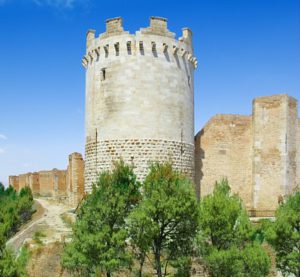My grandmother used to talk sometimes about a distant ancestor in our family line who was not Italian but Moroccan, and I loved that something so exotic could be part of the fabric from which we both were woven. It never crossed my mind back then to ask her more about this person, and now of course it’s too late to ask her. I’m older now and I’ve done a good bit of genealogical research on my family, tracing things back as far as the 1700s on my grandmother’s line, and the ancestor from Morocco has yet to turn up. But Italian records are notoriously muddy once you get further back in time than that. It’s a mystery I’ll most likely never solve, but chances are good that Grandma’s story is true, for the Southern Italian city from which our ancestors hail was once, in the 13th century, home to about 60,000 people of North African descent, all Muslims who had been expelled from Sicily by Frederick II, the Holy Roman Emperor. There have always been refugees, it would seem.
And so they left Sicily and traveled north and settled in Lucera, my maternal grandparents’ hometown, which became known then as Lucaera Saracenorum, or Saracen Lucera. They were Arabs and Berbers from Arabia, Tunisia, and Morocco. Sadly, things eventually did not end well for them, even in Saracen Lucera. We have always been terrible to each other, it would seem (consider much of the current political rhetoric today in our own country). Be that as it may, even if I never find that Moroccan ancestor in my lineage, the cultural influence of these people on the culture of my family and on families throughout Southern Italy is undeniable, especially in local dialects and in the foods we prepare, even after all these centuries.
If the ancestor from Morocco lived in Lucaera Saracenorum, then he would have celebrated Ramadan, which begins tonight, most likely, with the first sighting of the new crescent moon. The start of this month of fasting is never concrete, for it is based on that sighting and this can vary slightly from place to place. Ramadan commemorates the month when Mohammed received the first revelations of the Qu’ran, the holy book of Islam. The observance of Ramadan is one of the five pillars of Islam, with fasting during the daylight hours throughout this month, as well as an increase in prayer and charity. And while Ramadan is a month of fasting, the meals that break the fast each night with the setting sun are known to be quite wonderful and very celebratory––meals that, in some places, can last through the night. Meals flavored, certainly, with some of the same flavors––mint, almond, vinegar, rose water––that were brought by Arabs and Berbers to the tables of Southern Italy in centuries past. A thread alone hasn’t much strength, but a woven fabric is a different story.
Image: One of Lucera’s most famous landmarks, the Castello di Lucera. The building dates to the time of Saracen Lucera, built in 1233. My grandparents and all their ancestors––Italian and Moroccan––lived near this castle. Photograph 2006 Creative Commons.
